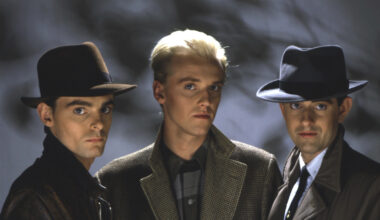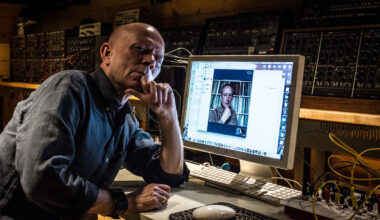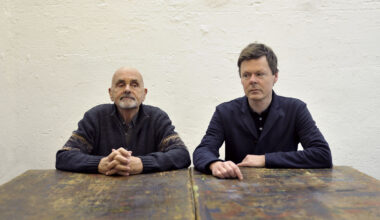With the release of remastered versions of classic ZTT albums by Frankie Goes To Hollywood and Propaganda, the label’s co-creator Trevor Horn discusses the controversial chart-topping smash hits, the law suits and some eye-wateringly expensive synths
At the very beginning of the 1980s, when digital music was still a glint on the horizon, Trevor Horn had a dream. He wanted to make pristine electronic pop that sounded like the past, present and future combined.
“I always saw it in my head as Glen Campbell meets Kraftwerk,” says Horn. “A pop record, but with the rhythm section of a techno band. It seemed like the most incredibly exotic thing at the time. I managed to make a few records like that… and then it pretty much became the generic sound of the 80s.”
As the decade unfolded, Horn went on to realise his vision by creating ZTT, one of the most iconic British record labels. He built his empire on cutting-edge technology, intense studio perfectionism, tough commercial logic and a more than a dash of punky shock-rock provocation.
He made mistakes, and enemies, and bad deals along the way, but he also created an unrivalled legacy of sumptuous, impossibly glamorous, impeccably crafted, occasionally scandalous music.
But long before the shiny modernist project of ZTT, Horn was fascinated by the new musical vistas promised by the embryonic age of electronic instruments.
Born and raised in Durham, he relocated to London in 1970 at the age of 21. While working as a session player for various artists, including disco star Tina Charles of ‘I Love To Love’ fame, he first began to experiment with “organic techno” recording techniques using home-made drum machines and rudimentary synthesisers.
“I started producing in 1974-75,” recalls Horn. “I was doing demos for songwriters, but I could never afford to work with strings. I was also up against people like Elton John, and their records sounded fantastic. When you’re coming from nowhere, it’s very hard to compete with that so I was looking for something different… and then I heard ‘Man Machine’ by Kraftwerk and that absolutely connected with me, because I read a lot of sci-fi in the 70s. Even though I was a traditional musician, I was always fascinated by techno.”
Horn’s space-age electric dreams led to The Buggles, the trailblazing novelty synthpop duo he formed in 1978 with keyboard player Geoff Downes. Partly inspired by JG Ballard’s story ‘The Sound-Sweep’, the pair conceived a fictional backstory for themselves as a synthetic pop band invented by a couple of computer programmers. But when The Buggles scored an unexpected Number One hit with ‘Video Killed The Radio Star’ in 1979, Horn was forced to abandon his conceptual conceit and take on the duties of a real life pop star. He still cringes about his brief spell in the limelight.
“If I was going to do it now, I’d take on a dancing teacher, and get a full-length mirror, all kinds of stuff,” he sighs. “Back then I was a dingbat, I was a muso. You didn’t consider how you were going to sell yourself on a TV show. We kind of got pulled into it, so then the name became a bit of an albatross. It’s a terrible name. My late wife used to say to me, ‘I don’t know why the fuck you ever called yourself The Buggles!’.”
Horn credits his wife and business partner Jill Sinclair, who died in 2014, as the driving force behind his shift from performer to producer. In 1980, he and Downes temporarily joined a new line-up of veteran prog rockers Yes, who shared a manager with The Buggles. But after a gruelling tour in late 1980, Sinclair persuaded Horn he was “not frontman material” and steered him towards concentrating on his studio skills instead. Horn’s first batch of production jobs included a run of creamy pop hits with electropop duo Dollar, ABC’s magisterial debut album ‘The Lexicon Of Love’, and Malcolm McLaren’s groundbreaking hip hop travelogue ‘Duck Rock’. Which was a pretty spectacular opening act.
“Jill picked ABC,” says Horn. “When I first heard them it just sounded like disco music with Bob Dylan lyrics! And it was Jill who also got me to do Dollar. I said to her, ‘Why do you want me to do these little pop acts?’, she said, ‘It’s really easy, you just do a Buggles record and they’ll sing on it’.”
Sinclair and Horn were married for 34 years. She was the business brain behind his notoriously painstaking studio perfectionism.
“Oh yeah, ZTT would never have happened without Jill,” nods Horn. “She very rarely came into the studio, but she had a very good instinct for what was commercial and what wasn’t.”
In 1983, Horn and Sinclair set up ZTT, striking a distribution deal with Island Records, which gave them ownership of one of London’s most technologically advanced recording studios, Sarm West in Notting Hill. The idea for the label crystallised while Horn was working on the ABC and McLaren albums with a team that included arranger and orchestrator Anne Dudley, engineer Gary Langan and Fairlight operator JJ Jeczalik.
This group formed the nucleus of the sample-driven avant-pop collective The Art of Noise, who were the very first act to release anything on the new label. Marketing for the label was handled by NME writer and media motormouth Paul Morley, who gave ZTT its achingly pretentious sleeve artwork and snappy manifesto: sampling the 20th century.
“Paul came up with the manifesto,” recalls Horn. “We first met when he interviewed The Buggles for the NME and he was pretty horrible to me. But after I did a few records with Dollar, he suddenly started writing great things about them, which I had not even remotely expected. I liked him because I thought he had the same sense of humour and irony that I did. He interviewed me again and he was great, we even managed to get into Private Eye’s Pseud’s Corner, which is one of my greatest achievements.”

One of Horn’s key ambitions for ZTT was to apply high-gloss production polish to artists that major record companies might consider too risky and left-field. Hence Frankie Goes To Hollywood, one the label’s first signings and biggest success stories.
“When I first met the Frankies,” recalls Horn, “they wanted to be a combination of Kiss and Donna Summer.”
Their notorious debut single, ‘Relax’, caused instant shockwaves with its sexually explicit lyric, the scandal fanned by Morley’s purposely provocative marketing, which included pornographic cover art and press adverts that promised Duran Duran would soon “lick the shit off their shoes”. DJ Mike Read famously banned ‘Relax’ from daytime Radio 1, which inevitably boosted the song’s outlaw credibility, propelling it to Number One in January 1984.
“The scandal wasn’t really the record, because you couldn’t really make out what people were singing on ‘Relax’,” argues Horn. “The scandal was because Paul Morley put some pretty out-there stuff on the single, which we didn’t see until it went out. All that ‘lick the shit off their shoes’, I had no idea what it meant, it was some kind of bondage thing apparently. I was a married man with children, I had very little idea about that kind of thing. That whole scandal didn’t hurt us in the slightest.”
According to folklore, Frankie Goes To Hollywood barely played a note on the debut album, the bacchanalian epic ‘Welcome To The Pleasuredome’. The reality, Horn says, is more nuanced. The band’s early demos were fairly rough, so the songs required extensive studio makeovers from himself and his fellow engineer/producer Steve Lipson, particularly the many extended 12-inch mixes that became a ZTT trademark. But Horn credits the band with learning fast as the album took shape.
“After ‘Two Tribes’ they really started to become much better,” he says. “They started to understand the studio. So something like ‘Born To Run’ is completely them, with just a bit of Steve and Richard’s keyboards. They spent days and days working that out and they did a really good job. Holly [Johnson] is a terrific singer and Paul [Rutherford] was almost the perfect counterbalance, as he had a much softer voice. It was good combination of people. But I don’t think Frankie would have been as big had we not spent all that time in the studio.”
ZTT became something of a cutting-edge audio laboratory for much of the 1980s, from the post-modern sound collages of The Art of Noise to the sumptuous art-pop anthems of Grace Jones. Forever testing the limits of sampling and sequencing technology, Horn bought a Fairlight digital synthesiser for a princely £18,000, a huge sum at the time. He then acquired a Synclavier “tapeless studio” system for over £100,000, only to find its drum machine was wildly inaccurate. A frank exchange of views with the company eventually led to improvements.
“It was very expensive,” says Horn, “and also it wasn’t in time! But the Synclavier had the best-sounding digital audio card out of any piece of equipment, ever. You can still hear it on ‘Two Tribes’ and ‘Welcome To The Pleasuredome’. Also, at the time when Fairlight had eight seconds of memory, the Synclavier had 67 seconds. But it cost an absolute fortune and it was out of date within a couple of years.”
Horn and Lipson continued their sonic experiments with ZTT’s other star signing, the German electro-noir quartet Propaganda. Their debut album, ‘A Secret Wish’, mixed cinematic synthpop with the sampled sounds of broken crockery, sledgehammers and metal bathtubs. Released in June 1985, the album made the UK Top 20, but its lukewarm performance left the band and label very disappointed.
“It didn’t score as big as Frankie, but to sign a German band and record them in England, and actually make it into the Top 20 was a pretty revolutionary thing to do,” claims Horn, “I only did ‘Dr Mabuse’, and sang a bit on ‘Duel’, it was mostly Steve [Lipson] who produced that album and he did a brilliant job. So much so that Michael Jackson’s ‘Bad’ album was really influenced by Propaganda. They ripped off just about every rhythm track on ‘A Secret Wish’. I know they did because Quincy Jones, who produced ‘Bad’, rang me up and wanted to licesne the Propaganda record for release in America.”
Relations between ZTT and Propaganda began to sour soon after ‘A Secret Wish’ was released. Torn asunder by internal tensions, the band took Horn and Sinclair to court to try and escape their contract. Complicating matters further, singer Claudia Brucken was married to Morley by this point, remaining with the label as a solo artist. Propaganda founder Ralf Dörper has previously said the band took legal action to fight a “slave contract” that saddled them with heart-stopping studio bills and almost no chance of seeing any royalties.
Horn disputes this version of history.
“They earned a lot of money, so it wasn’t a slave contract,” he shrugs. “It was exactly the same contract that George Michael was on. What you normally do with contracts is you renegotiate. It’s one of the problems with being close to the artists when you have a record label… especially if you’re married to them.”
ZTT backed down and released Propaganda from their contract on the eve of their scheduled court clash in 1987. Meanwhile, Frankie Goes To Hollywood suffered similar turbulence, first falling out with each other, then with ZTT. This time, Horn and Sinclair dug their heels in, slapping an injunction on singer Holly Johnson to prevent him from leaving the label and signing to MCA. After two years of legal wrangling, Johnson won a landmark case in 1988, with the judge ruling his contract was an unreasonable restraint of trade. Horn ended up looking like the villain of the piece. With hindsight, he concedes the label’s old school contracts were problematic.
“We were in a difficult situation because we had signed the Frankies and we had commitments to various people,” he recalls. “But our ZTT deal wasn’t good, we were going through Island which was going through EMI. When we originally started ZTT we wanted to do deals differently with the bands, where we paid all the recording costs and they got a slightly reduced percentage, but you couldn’t do a deal like that. Everybody wanted a different deal.”
By the end of the 80s, ZTT smartly tapped into the emerging rave boom by signing Manchester electro titans 808 State. While Horn had been using a Roland TR-808 drum machine since his Dollar singles, and was a renowned pioneer of the 12-inch dance remix, he was unimpressed with the flimsy nature of most club music.
“All that acid house stuff started nowhere and went nowhere,” he says. “There was no structure to it.”
Although ZTT’s imperial phase is closely identified with the 80s, the label actually enjoyed its biggest success in the 90s with the multi-platinum soul pop superstar Seal, whose first three albums were produced by Horn. Once again, he credits his late wife Jill with correctly spotting Seal’s commercial potential.
At 68, Horn is no longer the obsessive studio perfectionist he was when he founded ZTT at the dawn of the digital age. While he may have inspired an entire generation of producers, he notes with a wry irony how technological advances have made his sonic innovations somewhat commonplace.
“The stuff we used to do that would take hours and hours in the studio, you buy something like Ableton today and you can do half of it in an instant,” he laughs.
Horn currently has various projects in the pipeline, including a long-term plan for a stage musical set in a recording studio, and an orchestral album called ‘The Eighties Reimagined’ set for release later this year. Largely dormant over the last 15 years, ZTT remains a going concern, with, as we went to press, news that Universal Music Group had acquired the label along with its entire back catalogue.
Horn himself admits he has no great desire to take any more risks on new artists. Been there, done that, bought the Katherine Hamnett T-shirt.
“Unless I see somebody I’d really love to sign, who I believe would go all the way, I’m not going to do anything,” he says rather wistfully. “Record labels are one of the quickest ways to lose money.”
Remastered versions of ‘Welcome To The Pleasuredome’ and ‘A Secret Wish’ are both out on BMG






